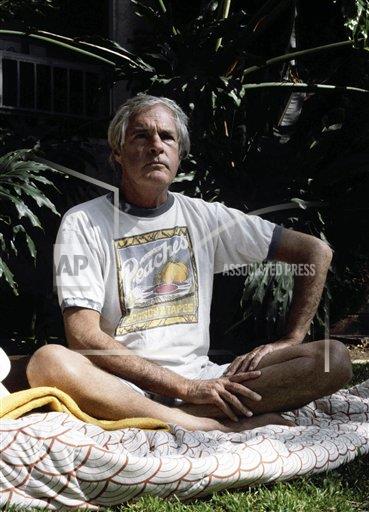— A trove of Timothy Leary files, much of it previously unpublished, could shed new light on the LSD guru, his controversial research into psychedelic drugs and the emergence of the 1960s counterculture.
The New York Public Library, which acquired the vast archive for an undisclosed sum from the Leary estate in 2011, is making the material available for the first time Wednesday to scholars and the public.
The archive "is the missing link in every attempt to piece together an account of research into Timothy Leary and the emergence of scientific research into psychedelic drugs and popular drug counterculture," said Denis Berry, a trustee for the Leary estate.
Leary, who coined the phrase "turn on, tune in, drop out," was one of the most polarizing figures of the counterculture. He advocated the therapeutic use of psychedelic drugs including LSD and psychedelic mushrooms. Allen Ginsberg, Abbie Hoffman, Jack Kerouac, Aldous Huxley and other noted figures frequently visited Millbrook Estate in upstate New York where Leary continued to conduct his psychedelic experiments after being fired as a psychology lecturer at Harvard University.
He spent several years in prison and lived in exile for several years in the 1970s. He died in 1996.
The files, filled with never-published correspondence and manuscripts from leading scientific, artistic, literary and cultural figures of the day, "will force a reworking of the current narratives on Leary, his role in LSD research" and the counterculture, Berry said.
The archive contains drug session reports, completed questionnaires and letters relating to the various organizations Leary formed to continue his drug research after Harvard, including the International Federation for Internal Freedom, Castalia Foundation and the League for Spiritual Discovery.
Among the highlights is a neatly typed description from 1966 of the psychedelic training courses Leary conducted at Millbrook and a 1975 letter he wrote from prison to "One Flew Over the Cuckoo's Nest" author Ken Kesey in which he says, "I think the time has come for me to go public about what I've been doing and learning."
These and the many unpublished manuscripts and letters from prison provide a rich source for research, said William Stingone, the library's curator of manuscript and archives.
John McWhinnie, a rare-book dealer who appraised the archive for the Leary estate, said in his report that the archive "details a program into psychedelic research that was akin to (Alfred) Kinsey's research into human sexuality."
The archive embraces the lives and thoughts of all the players associated with the scientific and popular movement of LSD and drug counterculture, said McWhinnie, who died last year.
McWhinnie was an associate of bookseller Glenn Horowitz, who eventually brokered the sale of the archive to the Public Library.
Among the collection's many photographs is one of Leary standing at a chalkboard in the 1950s giving a lecture on his first book, "Interpersonal Diagnosis of Personality." The book marked his reputation in the field of clinical psychology before he went to Harvard to begin his research with psychedelic drugs.
Among other things, it contains some 1,000 floppy discs that deal with Leary's intense interest in cyberculture and the development of computer software for his self-help games.
For now, the library has no plans to make the archive available online.
